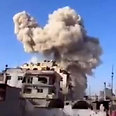
Assad era coming to an end?
NATO Chemical warfare, UN evacuation, rebel unification – all signs are pointing in direction of Syrian regime's demise
While this is not the first time such speculations have been heard, over the past few weeks the world has become more inclined to believe that Syrian President Bashar Assad's regime is on its last legs.
The rebels' advancement and stabilization, coupled with the increased discussion on chemical warfare and the intense fighting in and around Damascus, have created the feeling that Assad's days are numbered – or at least at the brink of a significant crossroads.
Related Stories:
Certain experts are of the opinion that the rebels will overthrow Assad in the near future. As analyst Joseph Holliday from CNN's Institute for the Study of War said, "The regime does not have the necessary capacity to keep hold of all of Syria and its control is systematically wearing thin throughout the country."
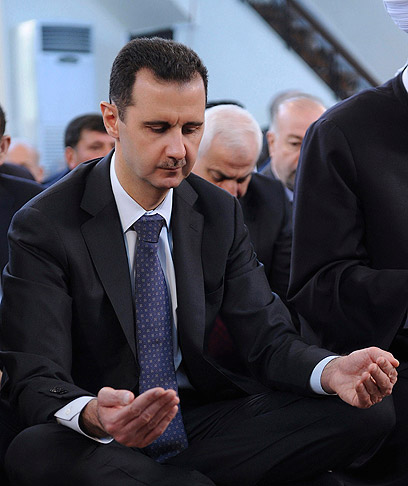
Is Assad on his way out? (Photo: Reuters)
Chemical Warfare
Assad's is believed to be in possession of the largest arsenal of chemical warfare in the world. The fear that it will be put to use has been an ongoing theme during this uprising. However, this past week, there have been various reports on the preparation of its actual use.
US President Barack Obama and NATO Secretary-General Anders Fogh Rasmussen sent an unequivocal warning to Assad stating that the world will intervene if unconventional warfare is aimed at civilians.
Damascus responded by saying that chemical warfare will not be used on Syria's civilian population. However, there were simultaneous reports on the intensified fighting in the area of al-Safira, where chemical weapons are held and on the air force bombings there.
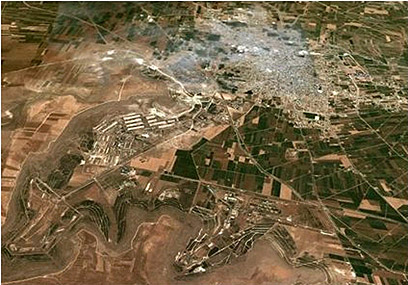
Chemical weapons base in al-Safira
Official US sources said that the Syrian army has loaded chemicals consisting of the fatal sarin nerve agent for aerial bombs and is awaiting instruction from Assad before using them against the rebels.
While the standoff over the potential use of nonconventional weapons by Syria and the West's possible response might be part of psychological warfare tactics by both, it is clear that both are angling for the end game.
UN evacuation
In light of the security situation, the United Nations notified last week that all its non-vital staff will be removed from Syria. All delegations scheduled to arrive in Syria was cancelled and all of the organization's activities have been suspended.
According to UN protocol, this is one step prior to complete evacuation.
In a coordinated effort made a few months ago, most European Union members expelled Syria's ambassadors from their countries. Most of the EU ambassadors were evacuated or returned from Syria, but until last week, Romania kept its ambassador in Damascus and is still hosting the Syrian ambassador in Bucharest.
The rebels unite
About a month ago, the various opposition groups in Syria managed to create a unified political body intended to represent them as a substitute government to that of Assad.
The Persian Gulf states were the first to recognize this body coined the, "Syrian National Council," led by Ahmed al-Khatib. France was the first western country to recognize the council as the representative of the Syrian nation.
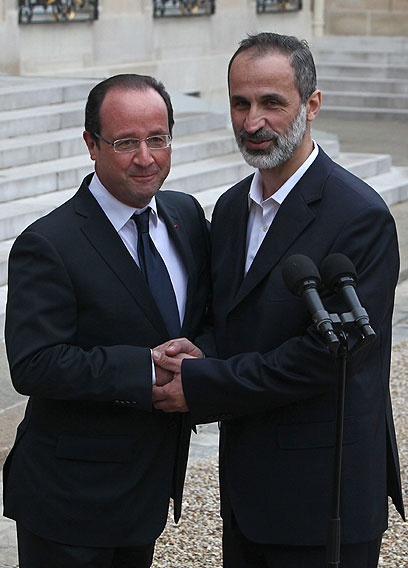
French president and Syrian opposition leader in Paris (Photo: AP)
The armed rebels have been operating under the auspices of the "Free Syrian Army" though they are not an actual army but rather a conglomeration of groups with various goals, ruling in different regions without much coordination.
Over the weekend, 500 representatives of these groups, met in Turkey and chose a supreme military council. This council consists of 30 members and one chief-of-staff, Salim Idris, a former officer in Assad's army whose ranks are comparable to brigadier-general.
The two groups considered most extreme, were uninvited to the meeting. The move, viewed as an attempt to formulate a unified, military, hierarchical structure, is likely to enhance the rebels' external support – and the flow of weapons into their hands.
About a week ago, the New York Times published an article entitled, "US weighs bolder effort to intervene in Syria’s conflict". The report, given by official Washington officials, emphasized that although decisions have not yet been made, the US, "administration is considering several alternatives, including directly providing arms to some opposition fighters".
It may be that this is solely psychological warfare, but either way, this indicates that the United States feels that Assad's days are numbered.
Turkey, Russia, Iran
After failing in its efforts to bring calm and a reform at the onset of the uprising, Turkey quickly turned its back on Assad, and Turkish Prime Minister Recep Tayyip Erdogan has spoken against him. On the flipside, Russia and Iran have enlisted to stand by Assad's side.
However, it could be that the balance is changing. Last week, Russian President Vladimir Putin met with Erdogan in Istanbul. The two mainly discussed their economic ties – Russia, which is a large supplier of gas to Turkey, will assist in the building of the latter's nuclear power plant.
However, they also discussed the Syrian conflict in detail. In addition, NATO granted Turkey a Patriot missile battery which will be installed in the country in order to protect it from Syrian missiles. Although this is a defensive measure alone, it sends a clear message to Syria that Turkey does not stand against it, single-handedly.
According to a report by the Lebanese, "Al-Mustaqbal" newspaper, the chairman of the Iranian parliament offered Assad asylum in his country, but he denied the offer. In a discussion with Iraqi representatives, the Iranian representative reiterated his intention to host Assad. That being said, the report appears in an anti-Hezbollah, anti-Assad paper.
All roads lead to Damascus
Large portions of Syria have already fallen into the rebel's hands and they have declared that they are currently advancing towards a Damascus campaign. The rebels have declared the Damascus International Airport as a battle zone and warned against approaching it.
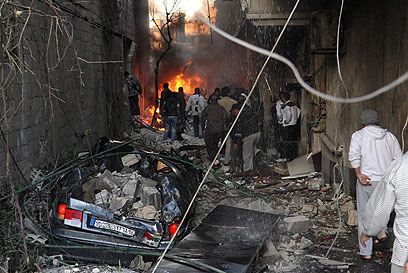
Terror attack in Damascus (Photo: AFP)
Last week, air traffic was halted for a limited amount of time and an Egyptian plane on its way there was turned back.
The head of Germany's BND foreign intelligence service, Gerhard Schindler, said that Assad's regime is dying and will not survive. "The armed rebels are coordinated better, which is making their fight against Assad more effective".
He also added that there is still no absolute victory but that the rebels are taking over more and more areas while Assad focuses on holding the front in Damascus and on military bases.
- Receive Ynetnews updates directly to your desktop










